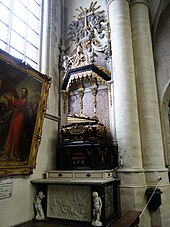Boniface of Brussels: Difference between revisions
Citation bot (talk | contribs) Alter: template type. | You can use this bot yourself. Report bugs here. | Suggested by AManWithNoPlan | All pages linked from cached copy of User:AManWithNoPlan/sandbox3 | via #UCB_webform_linked |
Rathfelder (talk | contribs) |
||
| Line 117: | Line 117: | ||
[[Category:1260 deaths]] |
[[Category:1260 deaths]] |
||
[[Category:People from Ixelles]] |
[[Category:People from Ixelles]] |
||
[[Category: |
[[Category:13th-century Roman Catholic bishops in the Holy Roman Empire]] |
||
[[Category:Roman Catholic prince-bishops in the Holy Roman Empire]] |
[[Category:Roman Catholic prince-bishops in the Holy Roman Empire]] |
||
[[Category:University of Paris alumni]] |
[[Category:University of Paris alumni]] |
||
Revision as of 18:51, 13 March 2021
Boniface | |
|---|---|
| Bishop of Lausanne | |
 Stained-glass window in the Saint-Peter's Church in Brussels. | |
| Church | Catholic Church |
| Diocese | Lausanne |
| See | Lausanne |
| Appointed | 1231 |
| Installed | March 1231 |
| Term ended | 1239 |
| Predecessor | Guillaume di Cenblens |
| Successor | Jean di Cossonay |
| Orders | |
| Consecration | c. 1231 |
| Rank | Bishop |
| Personal details | |
| Born | Boniface 1183 |
| Died | 19 February 1260 (aged 69) La Cambre |
| Sainthood | |
| Feast day | 19 February |
| Venerated in | Catholic Church |
| Beatified | 1603 by Pope Clement VIII |
| Canonized | 1702 Saint Peter's Basilica, Papal States by Pope Clement XI |
| Attributes | Episcopal attire |
Boniface of Brussels (1183 – 19 February 1260) was a Catholic prelate who served as the Bishop of Lausanne from circa 1231 until 1239 when he resigned after agents of Holy Roman Emperor Frederick II assaulted him.[1][2] His relics are housed at the Kapellekerk and at La Cambre where he had died.[3]

Biography
Boniface was born in what is today Belgium in 1183 and in 1200 moved from home to go to Paris for his studies at the college there. Boniface taught dogma and became a popular lecturer. He was ordained to the priesthood while in France and from 1222 until 1229 taught at the college. But there soon became a bitter dispute between the teachers and students which prompted him to leave and find work elsewhere.[3] He later taught until 1231 in Cologne at the cathedral school.[2][1]
He became the Bishop of Lausanne in 1231 and was enthroned in his new see in March 1231 after receiving his episcopal consecration. He was enthusiastic about this appointment but was faced with corrupt priests which he condemned in a pulpit address while also singling out King Frederick II.[3] The king sent his agents to attack Boniface who sustained serious injuries but managed to escape. He travelled to Rome and secured permission from a reluctant Pope Gregory IX to resign. The pope wanted to make him the bishop of another see though Boniface refused the offer.[1]
In 1245 he attended the First Council of Lyon which Pope Innocent IV had convoked.
Boniface died in 1260; his coffin is small because it contains assorted vertebrae and pelvic bones rather than an actual skeleton.[4]
See also
References
- ^ a b c "Saint Boniface of Lausanne". Saints SQPN. 31 January 2014. Retrieved 25 July 2014.
- ^ a b "St. Boniface of Lausanne". Catholic Online. Retrieved 12 October 2017.
- ^ a b c "St. Boniface of Lausanne (Feast: February 19)". America Needs Fatima. Retrieved 12 October 2017.
- ^ "Saint Boniface". Find a Grave. 2 April 1999. Retrieved 12 October 2017.[permanent dead link]
External links
- Jean-Daniel Morerod: Boniface in German, French and Italian in the online Historical Dictionary of Switzerland.
- Boniface of Brussels at Find a Grave
- Santi e Beati
- Boniface at Catholic Online
- Saint of the Day, February 19 hosted by St. Patrick Catholic Church (Washington, DC)
- Catholic Encyclopedia article about the dioceses of Lausanne and Geneva
